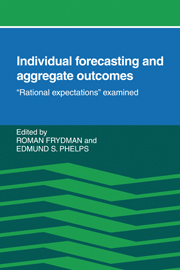Book contents
- Frontmatter
- Contents
- List of contributors
- Preface
- 1 Introduction
- 2 The trouble with “rational expectations” and the problem of inflation stabilization
- 3 Expectations of others' expectations and the transitional nonneutrality of fully believed systematic monetary policy
- 4 The stability of rational expectations in macroeconomic models
- 5 Individual rationality, decentralization, and the rational expectations hypothesis
- 6 Convergence to rational expectations equilibrium
- 7 A distinction between the unconditional expectational equilibrium and the rational expectations equilibrium
- 8 On mistaken beliefs and resultant equilibria
- 9 Equilibrium theory with learning and disparate expectations: some issues and methods
- 10 Keynesianism, monetarism, and rational expectations: some reflections and conjectures
- Index
6 - Convergence to rational expectations equilibrium
Published online by Cambridge University Press: 05 June 2012
- Frontmatter
- Contents
- List of contributors
- Preface
- 1 Introduction
- 2 The trouble with “rational expectations” and the problem of inflation stabilization
- 3 Expectations of others' expectations and the transitional nonneutrality of fully believed systematic monetary policy
- 4 The stability of rational expectations in macroeconomic models
- 5 Individual rationality, decentralization, and the rational expectations hypothesis
- 6 Convergence to rational expectations equilibrium
- 7 A distinction between the unconditional expectational equilibrium and the rational expectations equilibrium
- 8 On mistaken beliefs and resultant equilibria
- 9 Equilibrium theory with learning and disparate expectations: some issues and methods
- 10 Keynesianism, monetarism, and rational expectations: some reflections and conjectures
- Index
Summary
The use of the rational expectations hypotheses is now so standard in both the microeconomic and the macroeconomic literature that authors no longer feel the need to justify and explain the hypothesis. Nevertheless, this chapter discusses the arguments for using the rational expectations hypothesis in the light of recent work by myself and others on the question of how agents learn to form rational expectations (Bray and Kreps, 1981; Bray, 1982). See also Blume, Bray, and Easley (1982) for a survey of the literature on the subject.
Sargent and Wallace (1976) provide a variety of reasons for using the rational expectations hypothesis. They argue that it provides identifying restrictions for econometric work and a partial explanation for the finding that macroeconometric models fail tests for structural stability. Most fundamentally, they write that the rational expectations hypothesis “accords with the economist's usual practice of assuming that people behave in their own best interests.” This could mean that people act in their own best interests given their perception of the nature of the world; indeed, this is the nature of the Bayesian theory of decision making under uncertainty that underlies so many economic models. However, something more is entailed in the rational expectations hypothesis. Lucas (1976) writes:
Unfortunately, the general hypothesis that economic agents are Bayesian decision makers has, in many applications, little empirical content: without some way of inferring what an agent's subjective view of the future is, this hypothesis is of no help in understanding his behavior. […]
- Type
- Chapter
- Information
- Individual Forecasting and Aggregate Outcomes'Rational Expectations' Examined, pp. 123 - 138Publisher: Cambridge University PressPrint publication year: 1984
- 11
- Cited by



